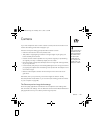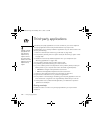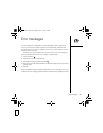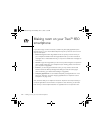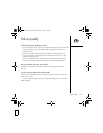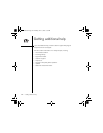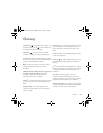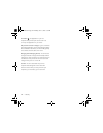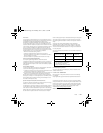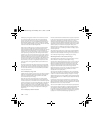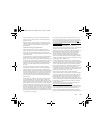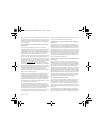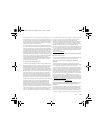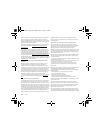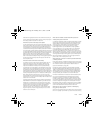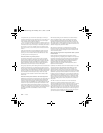
FCC :: 195
FCC
FCC Notice
This equipment has been tested and found to comply with the limits for a
Class B digital device, pursuant to part 15 of the FCC Rules. These limits
are designed to provide reasonable protection against harmful
interference in a residential installation. This equipment generates, uses
and can radiate radio frequency energy and, if not installed and used in
accordance with the instructions, may cause harmful interference to radio
communications. However, there is no guarantee that interference will not
occur in a particular installation. If this equipment does cause harmful
interference to radio or television reception, which can be determined by
turning the equipment off and on, the user is encouraged to try to correct
the interference by one or more of the following measures:
• Reorient or relocate the receiving antenna.
• Increase the separation between the equipment and receiver.
• Connect the equipment into an outlet on a circuit different from that to
which the receiver is connected.
• Consult the dealer or an experienced radio/TV technician for help.
Antenna Care/Unauthorized Modifications
Use only the supplied integral antenna. Unauthorized antenna
modifications or attachments could damage the unit and may violate FCC
regulations. Any changes or modifications not expressly approved by the
party responsible for compliance could void the user's authority to operate
the equipment.
FCC RF Safety Statement
In order to comply with FCC RF exposure safety guidelines, users MUST
use one of the following types of bodyworn accessories.
1. A palmOne™ brand body-worn accessory that has been tested for SAR
compliance and is intended for use with this product.
2. An accessory that contains NO metal (snaps, clips, etc.) and provides AT
LEAST 1.5 cm of separation between the users body and the unit.
Do NOT use the device in a manner such that it is in direct contact with
the body (i.e., on the lap or in a breast pocket). Such use will likely exceed
FCC RF safety exposure limits See www.fcc.gov/oet/rfsafety/ for more
information on RF exposure safety.
Specific Absorption Rates (SAR) for Wireless Phones
The SAR is a value that corresponds to the relative amount of RF energy
absorbed in the head of a user of a wireless handset.
The SAR value of a phone is the result of an extensive testing, measuring
and calculation process. It does not represent how much RF the phone
emits. All phone models are tested at their highest value in strict laboratory
settings. But when in operation, the SAR of a phone can be substantially
less than the level reported to the FCC. This is because of a variety of
factors including its proximity to a base station antenna, phone design and
other factors. What is important to remember is that each phone meets
strict federal guidelines. Variations in SARs do not represent a variation in
safety.
All phones must meet the federal standard, which incorporates a
substantial margin of safety. As stated above, variations in SAR values
between different model phones do not mean variations in safety. SAR
values at or below the federal standard of 1.6 W/kg are considered safe
for use by the public.
The highest reported (FCC) SAR values of the Treo™ 650 smartphone, by
palmOne are:
FCC Radiofrequency Emission
This phone meets the FCC Radiofrequency Emission Guidelines and is
certified with the FCC as.
FCC ID number: O8FMADECA.
More information on the phone's SAR can be found from the following
FCC Website:
https://gullfoss2.fcc.gov/prod/oet/cf/eas/reports/GenericSearch.cfm.
(The following information comes from a consumer information Website
jointly sponsored by the U.S. Food and Drug Administration (FDA) and the
Federal Communications Commission (FCC), entitled “Cell Phone Facts:
Consumer Information on Wireless Phones.” The information reproduced
herein is dated July 29, 2003. For further updates, please visit the
Website: http://www.fda.gov/cellphones/qa.html
.)
What is radiofrequency energy (RF)?
Maximum SAR Values CDMA Cellular CDMA PCS
Held to Ear 1.50 (W/Kg) 1.33 (W/Kg)
Body - Worn .999 (W/Kg) .667 (W/Kg)
FCC OET Bulletin 65 Supplement C
FCC Part 22H and Part 24E
Safety: EN 60950: 2000 (Jan-2000)
RushUG.book Page 195 Monday, June 13, 2005 1:33 PM



